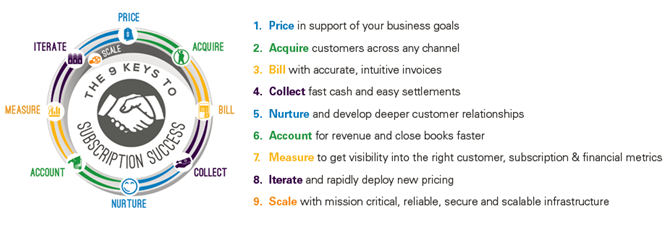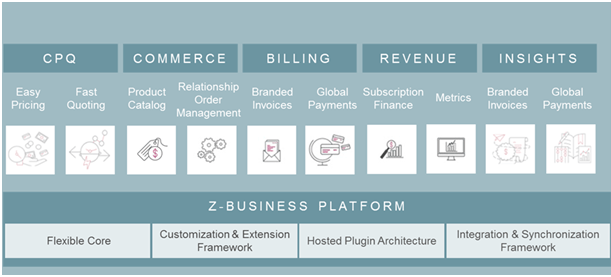Everybody uses subscriptions on a daily basis:
- Accessing emails (Office 365, Google Apps for Business)
- Access to internet (Telecom)
- Storing and accessing files everywhere anywhere (Onedrive, Dropbox)
- Watching tv (Netflix)
- Calling family, friends and colleagues (Telecom)
- Listening to music you like, when and where you want it (Spotify)
- Getting a diversity of healthy food delivered at your doorstep (HelloFresh, Smartmat)
- …
Subscriptions are the new way of selling
But selling, maintaining, invoicing and keeping up with upgrades and downgrades needs a whole other way of doing business. It’s very specific and handling thousands of transactions every day means you need the right tools. This will keep your costs and workload at a minimum and also keep your business processes optimized.
Because of this 4C invested in growing its expertise in a leading subscription management system called Zuora, which integrates with the Salesforce.com platform. We are now proud to have certified Zuora Solution Architects to help and advise subscription-based businesses from the implementation to configuration of Zuora and the integration with other systems like Salesforce.com and financial systems.
What is Zuora?
Zuora is a Relationship Business Management platform. From commerce, to billing, to finance and accounting, it brings solutions for your subscription business under one roof. And if integrated with the power and flexibility of the Force.com platform, it can provide end-to-end support for your internal processes.
Zuora has built a composite view of what it takes to build, run and sustain a successful subscription business. Distilling down the thousands of conversations with the business clearly showed that there are 9 core actions that all the subscription businesses are trying to do to drive success.

The Zuora platform provides all tools necessary for any subscription business

Where does Zuora fit into your business architecture?
Zuora sits at the heart of your subscription business. It provides a full-fledged catalogue for your products and services with options to build even the simplest to the most complex pricing models and charge types. Integrated with your eCommerce/Web Portal your product offerings are easily accessible to your customers for purchase. And the many out-of-the-box, PCI compliant, payment gateways make it easy to capture one-off and recurring payments.
It integrates with Salesforce through managed packages synchronizing your product catalogue, and provides guided selling features so sales reps can sell more in a couple of clicks. It also provides your sales, service and billing teams with a 360° view of your customers, their subscriptions, transactions, invoices and payments without having to switch applications. Of course the Force.com platform makes it easier to extend or overwrite default functionality to suit your needs.
Zuora comes with a complete billing and accounting system covering every financial step of your business from billing, to invoicing, creating adjustments, managing refunds to providing all necessary data to close the books, export journal entries and import into your General Ledger and back-end accounting systems like SAP.
An extensive library of SOAP and REST API’s ultimately makes it possible to integrate with almost any system you need it to integrate with, so the system can completely be customized to your business needs.
Still room for improvement?
As you can see in the picture above, Zuora offers an independent platform, which sits at the heart of your application architecture. This is a benefit because you can integrate it with any backend system, webportal, accounting system or CRM. But this can also be seen as a downfall because this has as a consequence that you have to rely on custom development to create custom webservices for integration with other systems, which results in a longer implementation lifecycle. With a rapidly growing company like Zuora, sometimes necessary features seem far away from production. For example, for international companies some features (such as translated product names, product bundles, etc.) are either not yet developed, or in limited beta. Despite this Zuora allows companies easy access to betas if the features are needed for business operation. Additionally, its REST API is still lacking, and even some simple functions have to be done via SOAP. But Zuora is rapidly expanding their REST API to provide those functions as soon as possible. Reports and reporting were less than adequate up until now. However, Zuora invested a tremendous amount of money and resources into fixing this, and it seems that the new solution addresses most of these issues with their new reporting engine which is in beta at the point of writing.
When choosing a subscription management system it’s important to be very clear in your business requirements and making sure that Zuora has the features you expect and need.
4C has inhouse experts that can help you setup, configure and integrate Zuora into your business processes making your company the Customer Company you want it to be.

